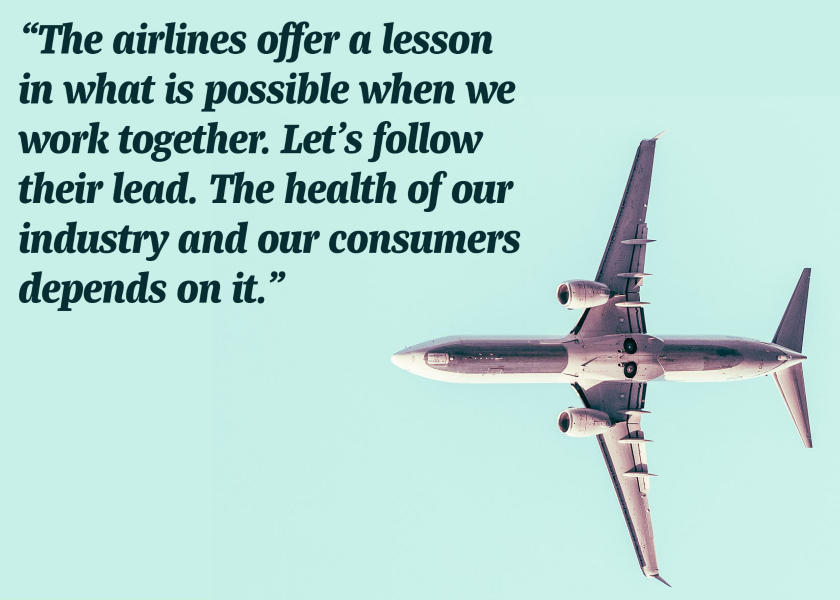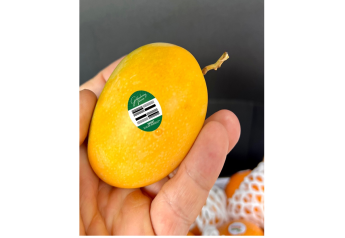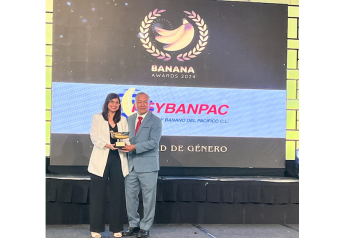Fear of flying and building trust

A recent Wall Street Journal article titled The Airline Safety Revolution caught my eye and should be required reading for the leafy greens industry and our food safety regulators.
Over the past 12 years, U.S. airlines have accomplished an astonishing feat: carrying more than eight billion passengers without a fatal crash. Airline safety records show that in 1996 the fatal accident rate was one crash for every 2 million departures. The fatality rate is now down to one for every 120 million departures. The only passenger death in the past dozen years was from an engine fan blade coming apart during a 2018 flight.
Is there something the produce industry can learn from this? The answer is most definitely yes. It’s the story of what can be accomplished when everyone — in this case pilots, labor representatives, aircraft manufacturers, airlines, and regulators — get together for a common cause: increasing flight safety. As the article describes it, a “wickedly difficult” process. Difficult because it required trust among the stakeholders, including the Federal Aviation Administration.
The article outlines how representatives of airlines grudgingly agreed to share information with each other, as well as with government, regarding budding hazards and near crashes. The cooperation was contingent on FAA pledges that good-faith mistakes and procedural violations wouldn’t result in enforcement actions. This amazing improvement in safety stems from a commitment by government and industry to discover safety improvements by analyzing huge amounts of flight data and reviewing tens of thousands of detailed reports filed by mechanics, air-traffic controllers, and pilots. Responses led to voluntary improvements rather than mandatory government regulations.
The fresh produce industry has made several efforts to anonymize and aggregate food safety data, but in the end, they have all fallen short because of trust — or, more accurately, lack of it. Many in our industry consider the tactics of the FDA to be heavy-handed and describe a culture that lacks interest in collaborating with its regulated parties. Bottom line — trust among competing growers and handlers is shaky at best. But the concern that regulators will use data against them is pervasive. And therein lies the biggest impediment to improving our own safety record.
“The data will set you free”, said Nick Sabatini, former FAA official. He describes airlines comparing information gleaned with competitors and the broader industry as one of the keys to the airline industry’s dramatically improved safety record.

We’ve heard this same sentiment from some in our industry. For example, Drew McDonald, VP of quality and safety at Taylor Farms, is known to describe enhanced product sampling as “test and learn.” McDonald says every test for pathogens, whether negative or positive, is a learning opportunity. What does the result tell us? Are our practices working?
We now have an excellent opportunity for industry to partner with government as part of a sweeping longitudinal study in the Salinas Valley being undertaken by the California Department of Food and Agriculture, FDA and industry. Western Growers, the LGMA’s partner in standards development, is undertaking a data-sharing initiative that will be underway by this fall. In fact, WG is currently developing a Food Safety Data Sharing Tool to be announced soon.
Will we trust in these efforts?
We should. A jumbo jet crash can result in a loss of $1 billion. What do repeated recalls cost our industry? What does the FDA stating do not eat spinach or romaine cost us financially, and reputationally? And tragically, what about the people that consume our products and are sickened and whose lives are impacted or even lost? The cost to them and their families has a lasting impact.
Leading companies in the lettuce and leafy greens industry need to envision what is possible with a new mindset, one where we trust each other and learn from each other. We’ll hope for the FDA’s cooperation as well. But their involvement should not impede us from learning from our data, sharing that with others and making systemic improvements based on these learnings.
The entire industry needs to participate and collaborate. We need to learn from each other. We need to make data driven improvements in food safety.
Tim York is CEO of the California Leafy Greens Marketing Agreement.







